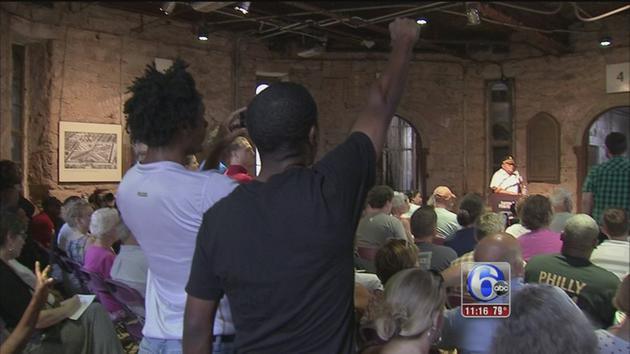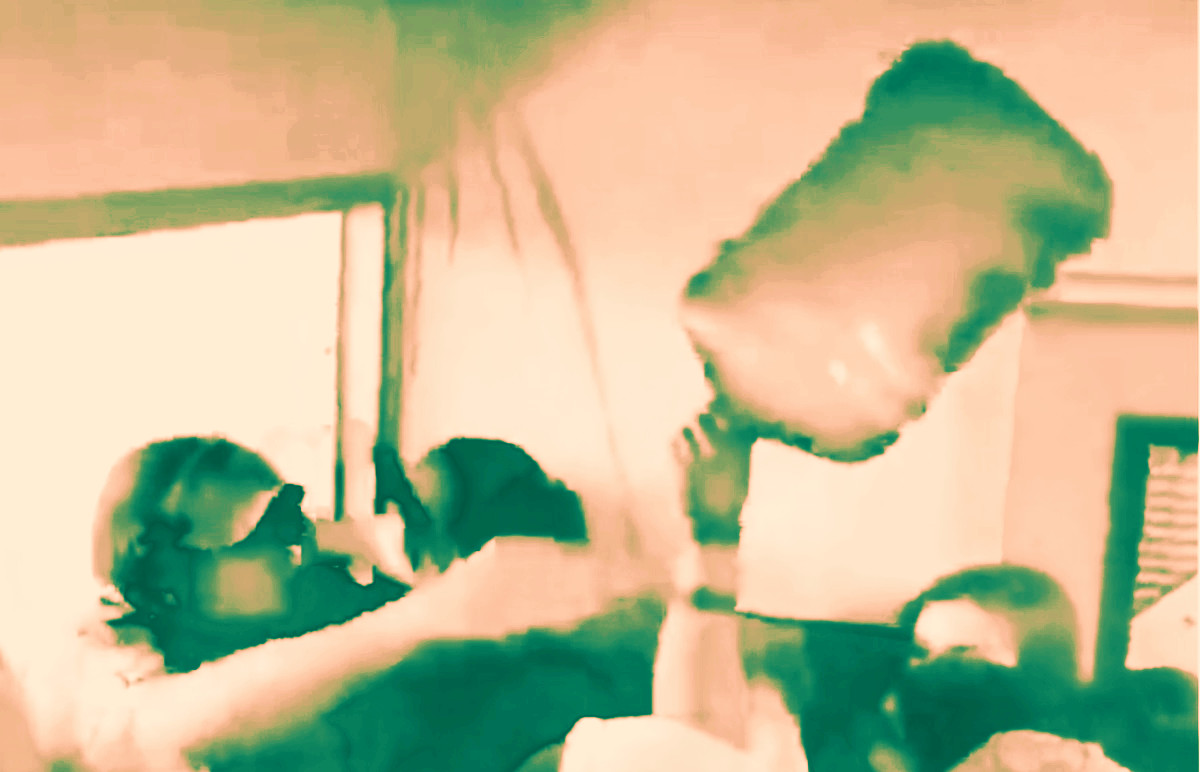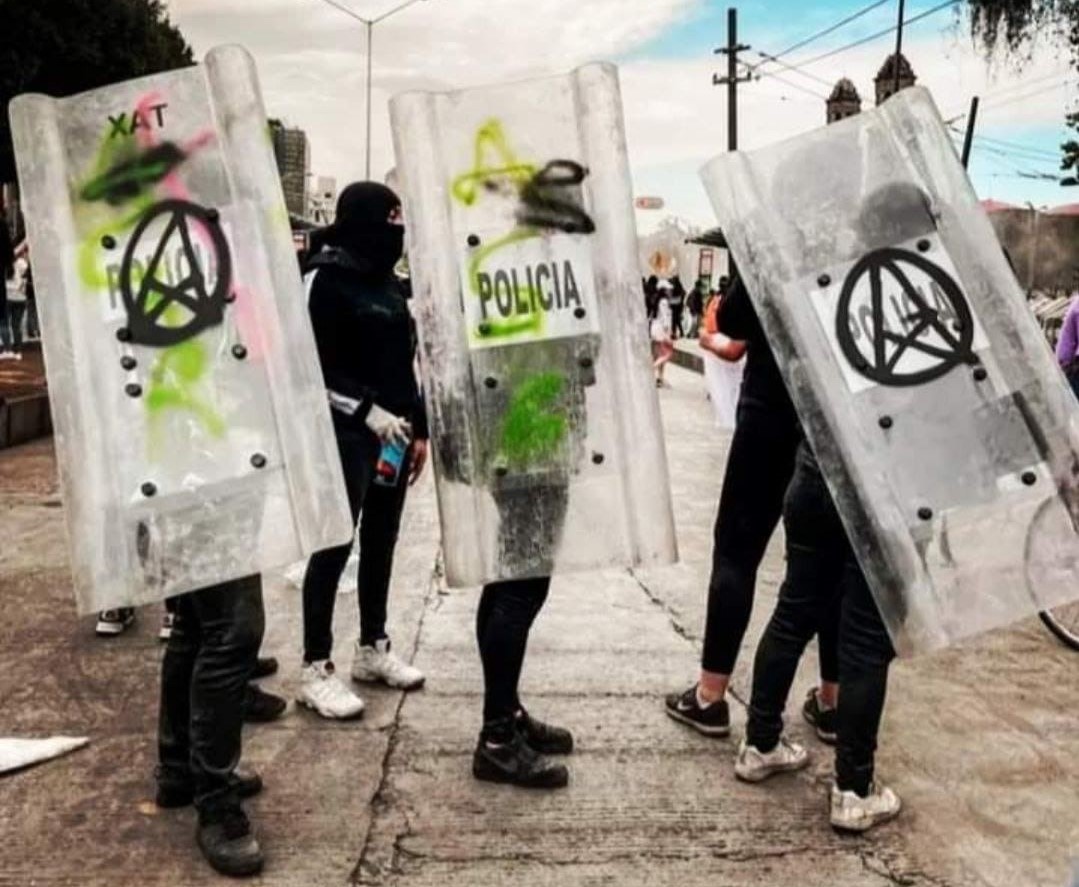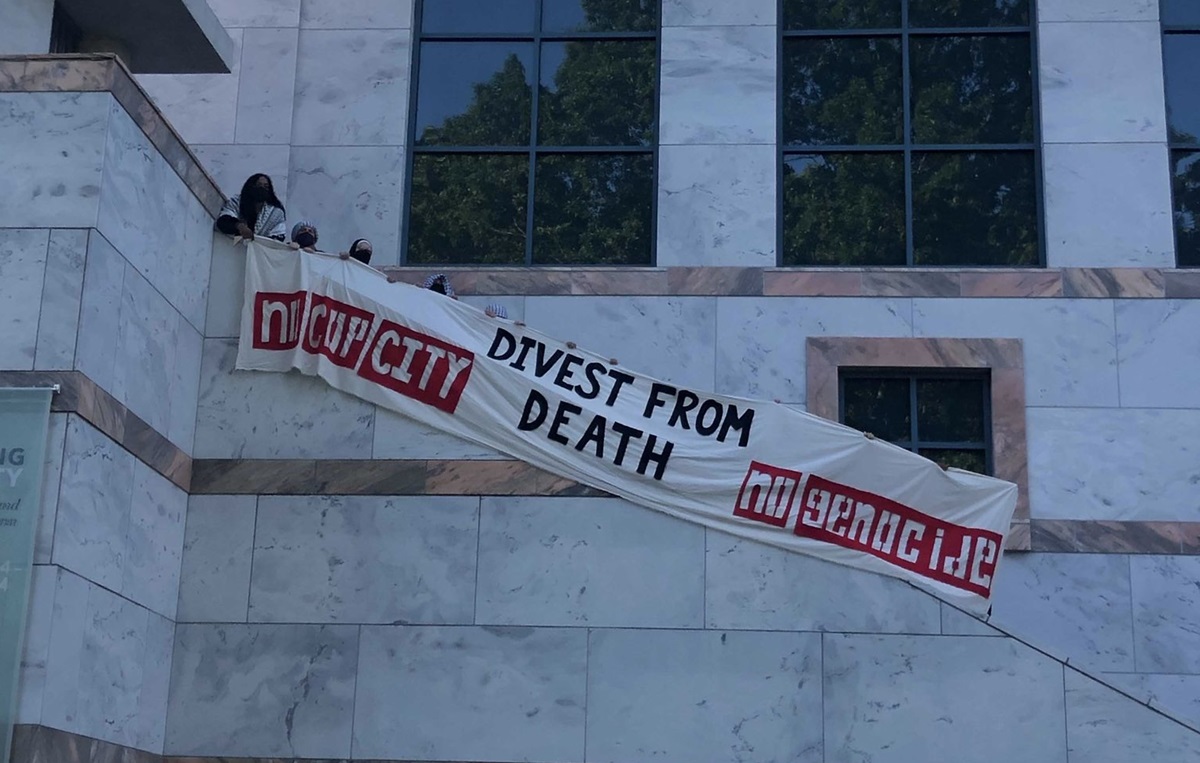Filed under: Community Organizing, Northeast, Police

From FTW/WTF

Philadelphia Police Commissioner Charles Ramsey has complained that “…there’s no opportunity for dialogue” after members of the Philly Coalition for Real Justice (PCxRJ) and Trayvon Martin Organizing Committee/Action Against Black Genocide (TMOC/AABG) disrupted a meeting he was speaking at last week.
He’s absolutely right: our tactics are designed to force him to do something he doesn’t want to do; they’re intended as a demonstration of power, an act of war against an enemy, not a gesture of civility in a barbarous system.
To be honest, we’re not interested in a dialogue with the man who for almost six months refused to release the tapes showing the police murder of Brandon Tate-Brown, tapes that exonerate Brandon and blew huge holes in the police story of the shooting. On top of this, Ramsey only released the names of the officers responsible for killing Brandon, Nicholas Carrelli and Heng Dang, in response to massive and continuing street protests, a lawsuit, and constant media attention to the case
It’s not surprising that Ramsey is trying to cast us as unreasonable. For him, it was reasonable to withhold from those of us demanding justice for Brandon damning evidence against these killer cops. For him, it was reasonable to lie and claim Brandon was the aggressor in the situation. If he thinks that lying and withholding evidence is reasonable, then we are proud to be unreasonable.
These “reasonable” moves on Ramsey’s part surely made District Attorney Seth Williams job a lot easier when it came to clearing Carrelli and Dang of any wrongdoing, since he knew he would not face severe public backlash without the tape of the murder being circulated. Ramsey did everything in his power to protect the killer cops he employs, all the while presenting himself as an alternative, “21st Century,” more reasonable type of cop. If this is what reasonable people do, then we wear our unreasonableness with pride.
We, the people actually interested in ending police violence for good, know all too well what dialogue with a bureaucrat like Ramsey would mean. It would mean a lot of meetings where politicians defer responsibility or claim that they don’t have the power to give us what we want. Well, if you don’t have the power, then why the hell are we talking to you? (We have already played this game, see here).
It would mean more bureaucracies, more panels, more commissions, more useless bodies that “advise” and produce “shocking” reports about things everyone already knew, but have no teeth to implement anything. It would mean more talk, more hot air from people who already talk too much. Politicians and bureaucrats are not people we dialogue or negotiate with, because the moment we do either, they’ve already won. We must fight them on our terms, not on theirs. What needs to be understood is that politicians really only speak one language, and that’s power! They will respond to our ability to flex our collective power, which is determined by our ability to make them look incompetent or by making their roles in society irrelevant.
Charles Ramsey also made sure to come at us with the played-out reactionary line: “If they want to really deal with the issue of black lives and the number of homicides that take place, then you have to look at the crime that takes place on the streets of our city — black on black crime.” Violence between people of the same oppressed group is a concern of everyone fighting against exploitation and oppression but there’s absolutely no need to create a special distinction for “black on black” crime.
Whites murder other whites at roughly the same rate, yet we don’t ever hear about how “white on white” crime is some sort of epidemic requiring particular attention. White males are more likely to be involved in starting wars, mass shootings at work or schools, terrorist attacks on US soil, and laundering money for international drug cartels. Whites are arrested more often for crimes like rape, robbery, assault, forgery and fraud. Let us not even get into the legacy of colonialism and genocide carried out by European settlers and their descendents because it would take up an entire of library of books to detail the crimes they committed. Yet white people are never collectively blamed for the actions of some white people, whereas black people in this country continue to be categorized as pathologically criminal.
This type of asinine remark made by Ramsey also ignores the social conditions in which many of the survivors and perpetrators of intra-group violence exist. It’s no mystery that people in dire poverty or desperate situations will at times do desperate things in order to survive. Many of our neighborhoods are plagued with violence, abuse, and addiction. Unemployment and dropout rates are always higher in the hood and the barrios, as well as in many poor and rural areas around the country.
These neighborhoods and communities didn’t get this way by accident, nor were they the result of individuals simply choosing to live in such conditions. They are the result of an economic systems that depends on inequality and underdevelopment of certain groups of people. As the great revolutionary thinker Frantz Fanon shows, we are violent against each other precisely because we can’t get our hands around the necks of the real enemy.
We are “penned in,” Fanon writes, and the system both makes us aggressive and denies us an outlet for that aggression. “The muscles of the colonized are always tensed… the colonist keeps the colonized in a state of rage, which he prevents from boiling over… The muscle tension of the colonized periodically erupts into bloody fighting between tribes, clans, and individuals.” They insult and humiliate poor black and brown communities every day, and yet “it is not uncommon to see the colonized subject draw his knife at the slightest hostile or aggressive look from another colonized subject.”
So-called “black-on-black” crime has the same exact cause as the white-on-black crime that upholds it. Few people are rich because many people are poor. Having more police present in the areas and neighborhoods that are more impoverished or where most people struggle to make ends meet hasn’t resolved the higher crime rates in such areas indefinitely, and it never will. Maybe at best it will lower certain types of crimes for a while, but eventually this sort of massive occupations by the cops of Black and Brown working class and poor neighborhoods becomes unsustainable.
So if more cops on our blocks is not the solution, as Ramsey would have us believe, what can we do to make our neighborhoods safer and improve our living conditions? We need to practice self-defense, self-control, and self-sustainability. We also need to understand how our neighborhoods and our lives came to be this way. Capitalism has always depended on unpaid labor for its development. Even when you’re paid a wage, they only pay you for part of the day, not the whole day. The part you’re not paid for is profit for the boss, and both wage and unwaged work keeps the capitalist system running. For hundreds of years since the development of capitalism different groups of people were excluded from earning a wage for their work; some of the most recognizable examples where enslaved Africans brought to work for free in the New World’s cash crop plantations, and many women who worked in the home but received no wage for their work.
While capitalism has historically extended the wage relation to more and more people, there has always been people who get excluded from wage work. Karl Marx called this the Industrial Reserve Army of Labor, and this group of unemployed workers plays a critical role in keeping workers in line and accepting lower wages, since the boss can easily fire them and hire someone who is unemployed. Basically, capitalism depends on some portion of the populations not having jobs so that those that do have jobs keep their heads low, and don’t start demanding a bigger piece of the pie that the boss has from the jump been stealing from you. Since capitalism in the U.S. developed alongside, and through, slavery, it had to develop an ideology that would drive a wedge between white and black: White supremacy. This ideology is built into capitalism, and as a result it has meant that Black workers are denied certain types of jobs, membership in many unions, and are usually last hired/first fired when they can get work. Historically, whenever the capitalist system went into crisis, it was Black workers who would experience the economic depressions and recessions first, and most severely.
So we need to be able to make our communities safer while we also create ways to sustain ourselves that challenge capitalism and the state. It’s important that we recognize the police for what they are, an enemy force occupying our neighborhoods. Cops exist to protect private property and to enforce laws that preserve capitalism and the state. In fulfilling this role, they reinforce the racial hierarchies developed since founding of this country. In practice, it means that more and more black, indigenous and latin@ people end up dead or behind bars.
Since black and brown workers/poor can’t rely on the cops to help us resolve issues in our communities, we need to create our own groups that can. We, along with numerous other groups around the country have been coming together around the slogan:
“Disempower, Disarm, and Disband” the police. As outlined by our comrades in Unity & Struggle, “We can disempower the police on the streets, by building neighborhood groups that respond to police abuse, and deter them from terrorizing us. We can demand the police be disarmed, taking away their military gear and firearms. And we can work to disband police units one-by-one, starting with the most vicious.” To do this, we can first start out with groups that try to check the police on the street. Copwatching is a good start, and has at this point become an activity most people are willing to do when they encounter the police harassing or trying to arrest people in their neighborhoods. But if the police begin to use force, we need to be prepared to step it up. We can’t simply film another one of us getting beaten, killed or maimed by a killer cop. If we outnumber them, then we need to be prepared to act accordingly. Eventually, we can build enough of a presence and reputations where the police will have to get permission from our groups to enter our neighborhoods, essentially making them No Cop Zones.




